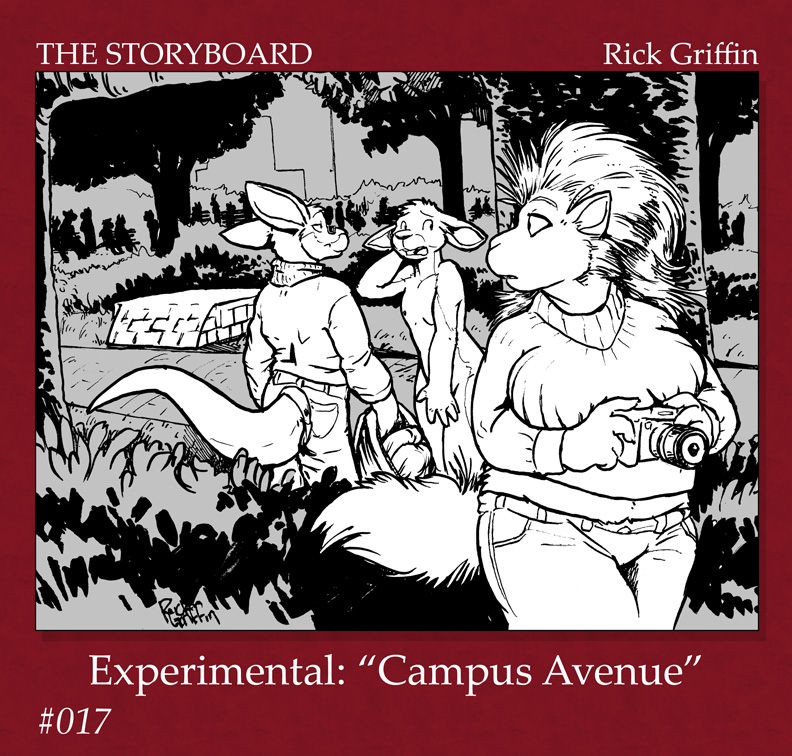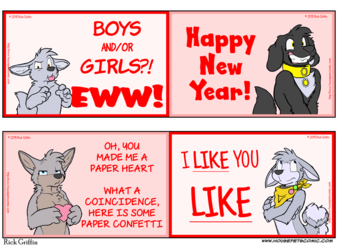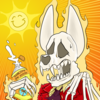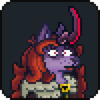Sign In
CloseI have here an experiment. I wrote a story just as it came to me, purely in the interests of having fun with it. It's been refined a few times sense then to improve the flow and give more context, but it's mostly just a pure romp of the weird things that happen in my mind.
Total words: 3000 (approx. 12 pages)
Campus Avenue bears a strange energy, intangible, ethereal. Halfway between the Administration Building and the Lower Dorms, six ancient stoneworks line the road. They are arranged the same way as the pips on the six side of a die, even rows with a gap between, where the brick road runs.
The pedestals are four feet off the ground at their highest, each with a low ramp that runs to the edge of the road and no further. The road is not part of them, since the stoneworks were constructed from a form a basalt known only to exist miles below the surface. The road is red brick only. The road is not special save that when it was built, the road crew specifically, carefully, painfully measured the spacing between the pedestals that they should avoid the road sides from touching the edges of the stone ramps.
Nobody had asked them to. That is what everyone knows about Campus Avenue: nobody wants to disturb the stoneworks. They are scarcely documented. The university’s most prestigious archeology team had determined little, except, “they are there, and have been for a long time.”
All historical records which have ever mentioned the stoneworks said more or less the same.
When the university was founded, they situated benches around Campus Avenue in a radius, the space all between filled with shrubs and trees, rarely tended to be groundskeepers. The benches are always full, with more standing beside. The place transfixes people. At a respectful distance, students discuss campus life, classes, work and money, and with an easier, calmer, and more relaxed tone than anywhere else.
Though little can be said about the stoneworks academically, what have been passed around are the rumors, which become stories. They are also spoken in the circle around the avenue. And so, as universities are wont to do, it became a tradition that incoming freshmen had to walk down the avenue between the pedestals at least once.
Naked.
Reed stands uneasily at The Line. Reed lived up to his name, being reedy for a kangaroo, russet in color with white belly, arms and legs, and perpetually anxious, as though the early-autumn wind shook him. His clothes removed, he is down to his skivvies. He rests on his large feet uneasily, rocking them back and forth, until Clay takes him by the arm.
Clay, also a kangaroo, holds Reed’s bookbag, stuffed with Reed’s clothes, and also his own bookbag. Clay smiles at Reed, his darkened muzzle tips emphasizing the movements of his face. Reed considers: that Clay is putting him up to this, but also that Clay is his dearest friend.
“This is stupid,” Reed says, looking down where The Line ended at the tip of his long middle toe. The Line was so named because it was where the graffiti ended. As the rumors went, even a gang who had once spray painted the bell tower and pulled down the statue at the garden square stopped here and walked quietly through.
“A little, yeah,” says Clay, shrugging his shoulders. His gray fur and broad shoulders makes him appear older than he is, but only from a distance. When he opened his mouth, he didn’t sound any older than Reed; he is only one year Reed’s senior. He adjusts the rectangle-rim sunshades that rest on the flat of his muzzle. “They’re just some old rocks. Everybody makes a big deal about it, but if we stopped then there wouldn’t be as much significance. Most of it’s just in your head.”
“But that’s just it. It’s not the stone things, it’s that everyone’s watching.”
From their vantage point on the road, only a few people are even visible beyond the green shrubs and trees. Yet the two had just been back there when Clay proposed the idea. There were at least a hundred students milling about in the mid-afternoon, mostly doing homework or messing with video streaming on their phones. They didn’t even take any drugs or alcohol around this place; it “felt” unnecessary, though Reed could not determine why.
It wasn’t that Reed didn’t know why he was doing this—he did it because Clay asked. And when Clay asks, Reed would do anything.
He owes it to Clay. Reed doesn’t have the words to say why, though it was a common enough feature of his whole life it is merely how he “is”. Words always stick in his throat, unsaid in part because he cannot get his thoughts to behave, and he dismisses them. Yet the unspoken lines wheel away somewhere in his forgotten mind.
“They’re not even paying attention,” Clay says.
“Yes they are,” says Reed.
“Then imagine them in their underwear.”
Reed stares daggers at Clay as he stuffs the remainder of his clothes in the bookbag. There wasn’t much use protesting, besides now being cold. Reed was only somewhat trim, mostly due to late growth spurts at the end of high school, though he was still naturally heavy around his waist. Being naked bothers him mostly on an intellectual level. He tries to casually cover his maleness with one hand, though the whole arm ends up stiff and awkward in the attempt. He stares again at the end of The Line.
“The sooner you get across, the sooner you can get your clothes back on,” says Clay as he urges Reed with a gentle shove on his lower back.
Reed awkwardly steps over the line. Almost as awkwardly, he turns, facing Clay, and grabs his hand.
“Please come with me,” Reed says.
There were reasons Clay could object, primarily because it was tradition for freshmen to walk alone. But Clay must have felt the trembling in Reed’s hand. Without hesitation, he nods, smiles, and drops the bookbags just over The Line.
Reed’s hand bashfully releases Clay’s to let him undress. They’d been friends since elementary. But Clay had been there when Reed’s father died, and something had changed between them. Though Reed would do anything for Clay, he often works himself up into fits of anxiety, thinking this time he’s asked too much of his friend. He twists in his place and runs his hands through his head fur.
If he’s asked too much of Clay, Clay has never said. Clay smiled warmly, as he always did, and put Reed back at ease.
The last thing Reed would believe was that he deserved a friend like him.
Once Clay removed his sunshades and stuffed them into his own bookbag, he stands. Unlike Reed, his body is pitch-perfect in fitness, not merely by chance but by effort. It bred jealousy in Reed, in a way—only that he wished his own body could make things easier. What fun it would be to have Clay’s body! It would be easy to attract girls, maybe, and Clay probably doesn’t feel the least bit self-conscious about being in bare fur.
Clay gestures forward, and walks beside Reed with his arms clasped behind his back.
Reed barely even sees the first row of stoneworks as they pass, as he continues to shoot glances at Clay. They had been naked together enough times before that it should not bother him, and yet it does. Why did he ask Clay to walk with him?
Besides his own self-consciousness, Reed doesn’t feel much of anything. The road feels the same as the road before The Line. The grass is just as green, the wind just as bitingly cool. Time didn’t speed up or slow down, and the anticipation in Reed’s chest doesn’t give way to any “release” that he anticipated.
“Bit of a let-down,” Reed says.
“I said it was a bit boring,” Clay says.
“But there’s all the stories. I mean, they don’t make any sense and they are, without exception, self-contradictory. I thought maybe there was something about this place that would fuel it.”
“Like what?”
“Well, there’s the one time a lion was overcome by the energy, stood on one of the platforms and transformed into a lioness. I think that’s pretty big.”
Clay points it out, the middle stonework on the left side. “That one. And she was always a lioness. Says so on her school records.”
“Then why does everyone say she was a lion before? I mean, you even know which platform it is.”
“It happened before I enrolled,” Clay says. “But that’s mythology . . . It evolves, the little details become sticking points, and give details to make the story more real. This one is called Pedestal C, by the way.”
They stop in front of it. It looks the same as all the other stoneworks: simple and unadorned. No fancy carvings, no magic runes. They are made of very plain, very ordinary, very very old rock.
“It’s almost like the head of a piton that’s been hammered into the ground,” Reed says, stepping to each of its corners to get a good look. He hunches down for a lower angle.
“It’s almost what they are,” Clay says, “It hasn’t been measured exactly, but they reach a long way underground, and they taper.”
“So why would people just start attributing power to them, then?” asks Reed. “I mean, the stories have to come from somewhere. If she—”
“—Penny.”
“. . . You even know her name? If Penny were a lioness all along, why would anyone, let alone a constant swarm of witnesses, believe she was a lion before?”
“Well, maybe you could test it. You’re a science major, right?”
Reed stands back up and rubs the back of his neck. “Test it? Like . . . If I walked onto that platform, I’d become a jill?”
“What better way to try?”
“I don’t want to be female!” Reed says, squeezing his eyes shut at the line. He knows what it sounded like—too quick to protest; the words felt all wrong. Not that they are untrue, only that they were inordinately defensive.
“You’re not actually going to become a woman,” Clay rolls his eyes and folds his arms. “Just step on the platform.”
Reed’s heart jumps into his throat. He looks at that platform, hard, with eyes that could drill holes through mountains.
“Well?” Clay says
“I . . .”
Reed stops himself—he isn’t weak. He went two decades being weak, but he is older now. He is an adult, now far away from his family, save for Clay.
“Where’s that from . . .” Reed mumbles to himself.
He feels homesick, and it pulls him away from the stones. He turns from them.
“It’s a simple task, isn’t it?” Clay says, “Just step onto the platform.”
“Why don’t you?”
Clay sighs softly. “Because I know I can’t,” he says. “I’ve tried. Everybody does.”
“Then why do some people get on the platforms?”
“There’s a lot of theories . . . I’m not sure I believe any of them. But the one that I hear tossed around most often is that you can only step on a platform to receive something you desperately need.”
Reed considers. He wished for a great many things in his time, but he thought wishing to be impractical, especially as fear bolted him to the ground. He casts his eyes toward Clay again, noting his lithe body, and how envious he is of that body.
Clay smirks and opens his arms for a little pose. Reed blushes and faces away, fingers racing nervously through the fur on his arms.
“What is it?” Clay asks again.
“What if I just wanted a better body? One that I could be confident in. That’s something I know I want.”
“You can try.” Clay gestures to the platform.
Reed bites his lip and turns to the ancient stonework. He lifts his feet to the ramp again, and this time he falls back on his mental pattern of shoving the strange thoughts from his mind. He would not let those thoughts bother him; they will be buried somewhere far away, and he would never give them voice.
He stops.
Clay stands, arms folded, an amused smirk crossing his face.
Reed lowers his foot. He can’t push away the thoughts. His body contorts. He falls to his knees and curls his tail around his legs, face buried in his hands.
Clay’s tone suddenly turns panicked. “Reed? What’s wrong? Reed, what’s happening?!”
I remembered when my father died, I was inconsolable. I was so bedridden my parents thought me ill. And you came, and you did perhaps the same thing that my family had done—you embraced me, and you told me you’d listen, or stay with me, or do whatever I needed. But, importantly, that you would be there. Without even asking you made me the most important person in your life. As we sat in the dark at the foot of my bed, we played games on my TV, which had laid dormant until you came by. And I was still crying, but the endless nightmare stopped weighing me down. I became lighter. And you’d made me so happy, and I tucked my arm around your side, and you did the same. I wanted to be there forever, with you, who’d slew my demons.
You looked in my eyes.
And I looked in yours.
“Reed,” Clay says, stroking his ears, “You’re crying. Can you hear me?”
Clay takes Reed in both hands and cradles him. Reed shakes from his sudden stupor, finding his head in Clay’s strong chest as it had been hundreds of times throughout hundreds of consolations. Hesitating only a moment, Reed grabs Clay around his midsection and does not release.
Reed realizes he hadn’t said a word of the sudden onrush of images through his mind.
“Yeah,” he says, finally, as though he were forcing himself to speak in a silent dream.
“Let’s go back, you don’t have to do this,” Clay says. “Let me walk you back the way you came.”
Reed suddenly perks his head and his ears up. But he was not alert; the dream was not finished.
“Not this one. Platform A.”
“What?”
Reed moves. His hand does not unclench from Clay’s, as he drags him away from the mid-left platform to the far right one.
“Reed? What’s . . . What are you doing?”
They step onto the platform. Eyes are all around, but hidden among the green shrubs a distance away. They were nonetheless witnesses who say Reed face Clay on top of the ancient stonework, fully unclothed before each other.
In another time and place, it might have been an opportunity to shock, mocking, or jeers, but there was none of that here. The stones were sacred, and they sanctify the ones who stand on them.
“Clay . . .” Reed says, voice choking but unimpeded, “I don’t understand what’s happening, but I have a lot of things to say that I’ve denied myself from speaking about.”
“Go on,” Clay says, in a state of perfect understanding.
“I love you,” Reed says. He’d only said it once before, that time at the foot of the bed.
“I know that,”Clay says, smiling.
“And I’m gay. At least bisexual.”
“Yeah,” Clay says, “I was wondering when you’d admit that.”
“I didn’t say because I didn’t know if you’d reciprocate. I was terrified of driving you away—I mean, if you are straight, you’d be put off. If my mom or my step-dad didn’t approve, and I still don’t know if they would—then you could have been taken from me. And you being my friend is more important than that . . . But still.”
“There’s also the matter of admitting it to yourself,” Clay said. “That’s also important.”
“But that . . . are you, Clay? Are you attracted to me? Even a little, even if just a sliver. I ended up building a second, secret life for myself, one that hung on whether or not you’d accept me after you knew—”
“That’s always how it is . . .”
“Can’t you tell me?!” Reed says, his voice not cracking as though desperate, but a thunderous anticipation rising to a climax.
“Reed, that’s the other thing they say about these stones. It’s that it doesn’t matter what one was before they stepped on. Only what goes on after.”
“Then—”
“Yes, Reed. I love you. I’ve always loved you. And I always will.”
Reed’s tongue hangs in his mouth; his eyes dart every which way. Should he cry? Should he be elated? He does the only thing he had intended when he first stepped on the platform—he kisses Clay on the mouth. Clay returns it, and it is the sweetest, and most passionate gesture that Reed ever thought he’d have the pleasure to experience.
It does not occur to him how warm he feels, though the icy early-autumn wind flows between their fur. Reed could only think how wonderful it is to honor his love before everyone, to revere his closest friend, his now-husband, before all the witnesses.
“Did you hear the new story? Pedestal A. Two naked guys jumped on it and made out.”
The porcupine scratches her chin and shifts the phone cradled in her shoulder. She looks at a printout of the photo she took, of the cute russet kangaroo who’d brought his calm and considerate husband onto the platform with him.
“No, not in an exhibitionist sense, you’re just not supposed to do it with clothes on is all. The rumor? Yeah, the rumor was they were married up on that platform, but all indication is that they were already married.”
She pins the photograph next to six others of the couple. They are arranged on the wall next to hundreds of other photos. The pictures immediately to the right of the roos are of a beautiful, confident lioness standing on a stone platform.
“I mean, marriage records can’t just appear out of nowhere, can they? It’s only a rumor. There’s always another story about what happens on Campus Avenue.”
Submission Information
- Views:
- 946
- Comments:
- 5
- Favorites:
- 35
- Rating:
- General
- Category:
- Visual / Traditional









Link
stokerbramwell
He looks so darn cute all shy like that, hee!